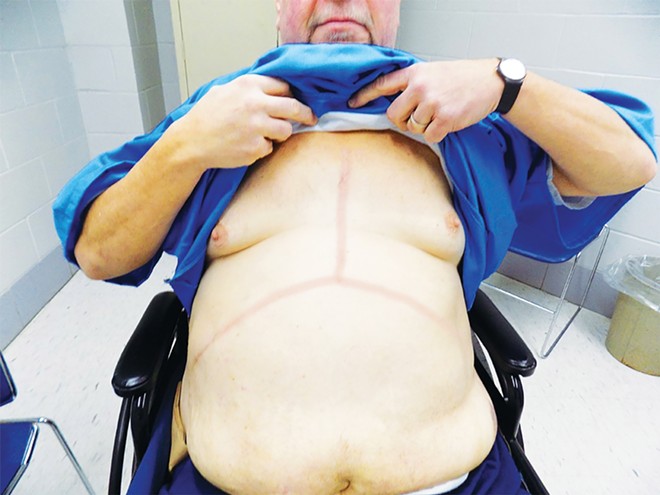A court-appointed monitor retained to figure out what's wrong with prison health care and how to fix it is calling for an overhaul and has asked to meet with Gov. JB Pritzker and state prison director Rob Jeffreys.
The request from Dr. John Raba is in a report by the doctor recently filed in federal court as part of a consent decree aimed at improving prison health care. In his report, Raba blisters the status quo and says that neither the corrections director nor the governor have involved themselves in plans to improve a health care system he says should be run by a university.
Money and misery are at stake. Illinois historically has ranked near the bottom of per capita spending on prison health care. While there have been some improvements since the state entered into the consent decree two years ago, Raba writes, much remains to be done. Meanwhile, prisoners suffer, and sometimes die.
In his report, Raba catalogs staffing shortages, breakdowns in care and failure of the state Department of Corrections to properly oversee vendors, including Wexford Health Sources, a Pennsylvania company that holds a contract worth nearly $1.4 billion to provide health care in Illinois prisons.
Nine Wexford doctors working in state prisons have been disciplined by state licensure authorities, Raba writes, and three currently are on probation, but Wexford hasn't told the state about disciplinary histories, and problematic doctors aren't being sufficiently monitored. Raba says that he's told the Department of Corrections that three Wexford doctors without proper credentials, including two whose licenses are on probation, have such serious issues with qualifications and bad care that they should not be employed in prisons.
The Department of Corrections wouldn't say yes or no when asked whether those doctors are still on the job. "There is a clear process laid out in the consent decree that IDOC is following in response to these preliminary findings and we will continue to follow that process as the monitor continues its review and develops final findings," department spokeswoman Lindsey Hess wrote in an email.

The state, Raba found, has no plan for improving the quality of doctors working in prisons. "This item has the greatest impact on overall quality of care yet is not addressed satisfactorily," Raba wrote. "It must be addressed."
Staffing shortages number in the hundreds. Raba writes that the state in June provided him with a staffing analysis showing that 357 new positions, mostly for nurses, are needed to comply with terms of the consent decree. In addition to new positions, 275 budgeted jobs were vacant as of June. At the rate the state plans to proceed, the new positions won't be filled for seven years or longer, Raba writes.
Treatment delayed and denied
Poor care is putting patients at risk, writes Raba, echoing prior reports from court-appointed experts, including a 2018 finding that 12 out of 33 deaths studied were preventable, another seven might have been preventable and no conclusions could be reached about five cases in which deaths weren't adequately documented.
Raba says that COVID-19 issues prevented his team from obtaining records to evaluate 32% of physicians practicing in state prisons, as planned. But one of the three doctors recommended for termination had repeatedly failed to spot signs of heart trouble that showed up on electrocardiograms and did not promptly send a patient with angina and an irregular heartbeat to a hospital, which might have contributed to the prisoner's death, Raba determined. Wexford paperwork showed no discipline or issues with his performance. Rather, the company gave the doctor high marks in a salary review and praised him for being productive, responsible, willing to work extra hours and cognizant of expenditures, Raba reported.
In another case, Raba writes that a nurse continued passing out medications and checking on inmates in crisis cells after a guard asked her to check on a prisoner who was unresponsive and drooling. By the time the nurse finished her other tasks and arrived to check on the stricken inmate, CPR was underway.
Raba, as he did in his initial report filed last December, blasted Wexford for not allowing inmates to see specialists outside prisons unless approved by company employees in Pennsylvania who discuss cases without benefit of charts or examining patients. About 2,000 requests from onsite doctors to send patients outside prison walls are denied by offsite Wexford employees each year, reported Raba, who estimated that about 1% of denials are reviewed by IDOC officials who are supposed to review cases in which Wexford denies outside care. During a 17-month period, the state considered 217 cases in which Wexford denied outside care, Raba found, and overruled more than half of the company's decisions.
In one case, surgery was delayed for nearly a year for an inmate who had a growing mass near a shoulder. Three times Wexford overruled surgery requests by onsite doctors before the patient received an operation. Raba wrote that the mass might have been malignant, and delay could have jeopardized the patient's life.

In another case, a patient with a detached retina and cataracts who'd lost vision in one eye was denied eye surgery, a decision that was reversed when Raba's monitoring team spoke with the inmate and the prison's medical staff. Raba reported that the delay could result in permanent loss of vision. Colonoscopies were denied in favor of less effective testing for three patients who showed signs of gastrointestinal bleeding, which can signal colon cancer. A patient who developed a skin lesion wasn't allowed to see a dermatologist: If it gets bigger, Wexford decided, a referral could be made in the future. The decision was made by employees who'd never spoken with the patient or seen a photo of the lesion, and so could not rule out skin cancer, Raba reported.
Waits for dental care have lasted nearly two years. The median waiting time to receive dentures or fillings was nine months, Raba reported, and the median wait for an extraction was one month. Four prisons each had more than 200 inmates waiting for fillings, and three had between 100 and 200 prisoners on waiting lists, he reported. Ten of the 28 prisons with dental care facilities don't have dental hygienists, and so dentists perform teeth cleanings, which contributes to delays in filling and extracting teeth, according to Raba's report. Under the consent decree, the department is supposed to have a dental director, but Raba said no one had been hired when he prepared his report. Hess in her email says IDOC is aware of delays in dental care and is working on it.
Raba's report comes after a blockbuster verdict last December, when a federal jury in Springfield awarded $11 million, including $10 million in punitive damages, to William Dean, with the plaintiff, who was serving time for cocaine offenses, contending that Wexford had delayed diagnosis, then treatment, for what turned out to be terminal cancer. It is believed to be the highest verdict ever awarded an Illinois inmate in a lawsuit against Wexford, which did not respond to requests for comment for this story.
The Dean verdict aside, poor care alleged to have cost lives and caused permanent injury has not cost Wexford much, considering the company's $1.36 billion contract with Illinois. Since 2011, when the contract was signed, Wexford or the company's insurers have paid $17 million to settle more than 200 lawsuits filed by inmates or their estates alleging poor medical care. Some settlements include agreements covering incidents prior to 2011, when Wexford provided health care under a previous contract.
Claiming settlements are business decisions, Wexford fought to keep records secret, but the state Supreme Court last year ruled that what the company pays to settle lawsuits filed by wards of the state is public information.
"It is higher than I would have thought but lower than it should be," says Alan Mills, a Chicago lawyer who represents inmates in the class-action lawsuit that resulted in the consent decree.
"The problem is oversight"
The Department of Corrections last year established a pilot program with Southern Illinois University School of Medicine aimed at improving prison health care, with the university launching an Office of Correctional Health Care headed by Dawn DeFraties, who held positions in personnel departments at Central Management Services and the Illinois Historic Preservation Agency prior to becoming executive director of SIU's corrections health care division.
DeFraties declined an interview request through school of medicine spokeswoman Rikeesha Phelon. "We are still building capacity and navigating COVID-related timeline changes," Phelon wrote in an email.
Under the pilot program, SIU is supposed to provide care at four prisons. But Wexford cares for inmates at the same facilities, Raba notes, and the company's contract with the state says that Wexford is responsible for overseeing medical care in prisons. Raba questions the wisdom of Wexford and SIU providing medical care within the same facilities.
Should nurses, including those who are state employees, take directions from Wexford doctors or SIU physicians? Will SIU physicians be limited to prescribing drugs in Wexford's formulary, given that the company holds the contract to provide pharmaceuticals? If a patient dies who's received care from Wexford and SIU, which entity conducts the mortality review, and what happens if separate reviews arrive at different conclusions? Will the two entities have access to each other's medical records?
"Who is in charge of clinical services at these sites, SIU or Wexford?" Raba asks. "This arrangement is fraught with multiple conflicts and potential for patient safety risk issues and misunderstandings that can affect patient care and needs to be designed in a meaningful way that ensures patient safety."
Raba recommends that the state give responsibility for prison health care to a university. Four states now have such arrangements. For one thing, Raba writes, working for a university carries less stigma than working for a prison health care company, and so putting a university in charge might help in recruiting health care professionals.
Putting a university in charge, Raba writes, will require attention and action from the governor and the corrections director, who haven't been as involved as they should be in fixing prison health care.
Deals such as the SIU pilot program between the Department of Corrections and universities, Raba found, are being made piecemeal by low-level administrators who have no authority to develop long-term strategies, including the creation of a health system run by an academic institution instead of a for-profit company. "Discussions with the university-based programs need to be conducted at a higher level to ensure that there will be support for this effort." Raba writes. "The monitor wishes to meet with the (corrections director) and the governor's office to discuss these matters with respect to requirements of the consent decree."
Jordan Abudayyeh, the governor's press secretary, did not respond to an email. Hess wrote that IDOC officials have had "countless meetings" with Raba. "The work of the monitor is ongoing and we are committed to taking action in all areas where improvement is needed," she said. "We are also having ongoing conversations with the governor's office about the report and (consent decree) obligations."
State Rep. Terri Bryant, R-Murphysboro, says she's spoken with Jeffreys and believes the corrections director supports putting a university in charge of health care. A meeting between Raba, Pritzker and Jeffreys, she says, would be a good idea.
"I would encourage them to have a summit or whatever you want to call it, and I would strongly encourage the governor to listen to what Rob Jeffreys has to say," says Bryant, a former prison administrator who worked in dietary services before retiring in 2014. "I don't think that the Pritzker administration has given two flips about what Rob Jeffreys says. I think they're holding him responsible but not giving him the authority to do it."
The Wexford contract expires in April. Jeffreys recently told a pair of state Senate committees that the department is working on an RFP. Phelon, the SIU School of Medicine spokeswoman, said via email that the university has no plans to become the prison system's primary care provider as Wexford's contract nears expiration.
"SIU does not intend to bid on an RFP to provide full-scale health care to Illinois Department of Corrections," Phelon wrote. "At this stage, we remain focused on the pilot phases outlined in our current interagency agreement that goes through December 2022."
Bryant agrees with the court-appointed monitor: A university, not a corporation, should provide health care in state prisons. "These companies' bottom line is profit – they're for-profit companies," says Bryant, who, running unopposed, was elected to the Senate this week. "Like it or not, (inmates) are residents of the state of Illinois – you're still tasked with giving them good treatment. If the organization's bottom line is profit, how do you do that?"
While she said she hasn't read Raba's report, Bryant says that Wexford and SIU providing care within the same facilities isn't practical. She recalls Wexford nurses, who took orders from company doctors, not being able to take directions from prison health care directors, who were state employees, while she worked as a corrections administrator. "It has not been my experience that the right hand is able to tell the left hand what to do," Bryant says.
Within the past year, talks broke down that were aimed at getting University of Illinois-Chicago to help develop a quality improvement program to oversee Wexford and other vendors, conduct performance audits, review deaths and otherwise help ensure proper care. Hess says that SIU is working with the corrections department on quality improvement. "A part of this development will include a path for improved vendor oversight," Hess wrote.
Twenty states contract with private companies for prison health care, and that's not necessarily a bad thing, according to Mills. "I think that the problem is not the provider," he says. "The problem is oversight. The quality control process they have in place is totally inadequate."
Money, also, is an issue.
"Right now, there's no money for half of the things we know we have to accomplish," Bryant says. "From the judiciary side, they don't care: When the judiciary orders the legislature to do something, they expect it to get done."
A judge hasn't ordered enforcement of the consent decree, but similar litigation elsewhere has proven both lengthy and expensive for taxpayers. In 2011, the U.S. Supreme Court ordered California to release as many as 37,000 inmates because the state wasn't providing adequate medical care. In 2001, when California inmates sued, the state was spending $6,000 per inmate on health care, according to a ruling from the judge who put prison health care into receivership. In 2015, California spent $19,796 per inmate, by far the highest in the nation, according to a 2017 report by Pew Charitable Trust. Analysts for the California legislature blamed high costs on increased staffing and other measures forced by the lawsuit.
At $3,616 per inmate, Illinois ranked 42nd of 49 states in health care spending, according to the 2017 Pew report.
$17 million in settlements
When wooing prospective clients, Wexford has boasted about the quality of care and its litigation record.
"Over the past 10 years, Wexford Health has maintained a nationwide average of only 1.4 lawsuits filed per 1,000 offenders – well below the national correctional average of 10.43 per 1,000 offenders," the company said on its website as Wexford sought a $360 million deal with Alabama that was awarded in 2018, after a federal judge ordered improvements to health care in reaction to a lawsuit from inmates.
It's not clear how many inmates have sued Wexford in Illinois, where the largest settlement since 2011 was reached with the guardian of an epileptic inmate who, denied medication, was left partially blind and unable to walk or communicate. Wexford paid $3 million to settle; the state, also sued, went to trial, with a jury awarding $12 million.
Wexford has agreed to at least two other seven-figure payouts. The company paid $2.25 million to the guardian of an inmate left in a vegetative state after a company doctor failed to diagnose or treat hypovolemia, an ailment involving loss of blood. Wexford also paid $2 million to the estate of an inmate who suffered a stroke, was dismissed as faking it and died three days later.
Other payouts range from high six figures to nothing. A dozen inmates dropped lawsuits, apparently in exchange for promises to provide care. Andre Jones, who is serving life for killing his wife's kids – for years, they'd carted the bodies in a footlocker when moving between apartments – sued after periodontal disease went untreated and teeth, according to his complaint, began falling out. The 2015 settlement doesn't mention money. "Wexford agrees that neither it, nor its employees, will interfere in the administration of (redacted) recommended by (redacted)," the settlement reads.
Wexford agreed to pay $167,500 to the estate of a mentally ill inmate who'd been placed in segregation after being accused of stealing and threatened with more prison time. The warden was worried enough that he told a Wexford social worker to speak to the inmate. She failed to do so, and the inmate hanged himself hours later. State licensing records show no disciplinary action against the social worker, who now works for a school district. A guard found to have falsified records showing that required checks had been made on the inmate's cell has since been promoted to lieutenant.
Wexford also paid $250,000 to the estate of a woman who killed herself at Dwight Correctional Center in 2009, after running out of psychotropic drugs and pleading for more. She wrote three letters to the prison's health care unit, including one the day after her prescription was finally filled. "I'm shaking constantly, my hands and legs" the woman wrote. "My heart is racing. My thoughts are racing. This is an unbearable situation . . . I cannot take the turmoil. Please doctor, help me I am going crazy in here." She was found dead two days later.
Shortly thereafter, the three letters she'd addressed to the prison health care unit were found unopened.
Contact Bruce Rushton at























